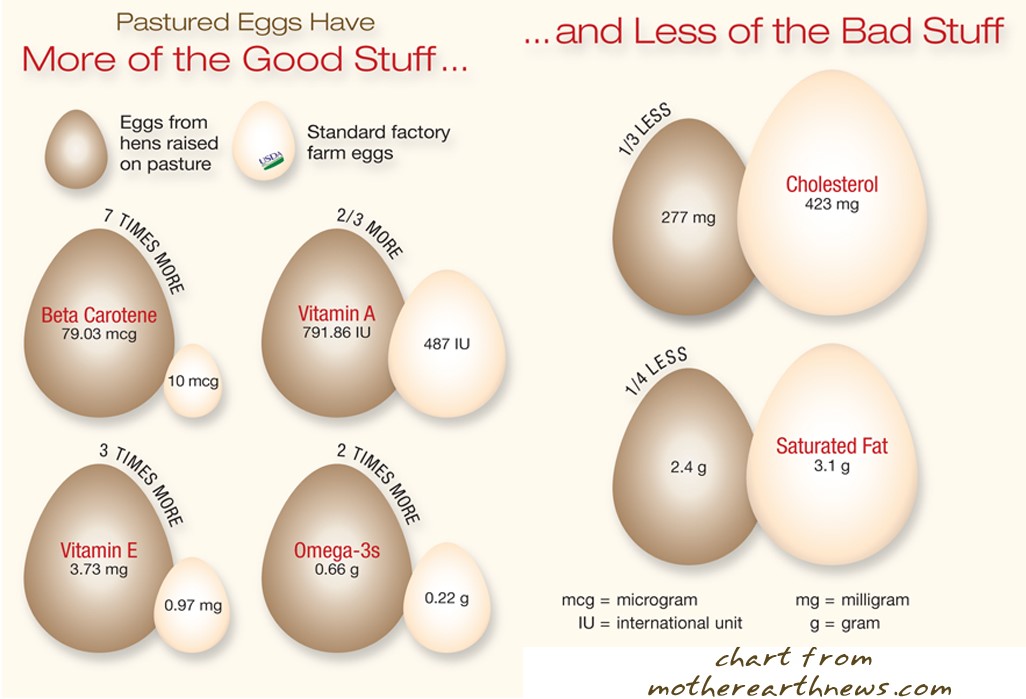Have you ever gone into the grocery store and been overwhelmed by all the labels on eggs? Phrases like "Farm Fresh," “Natural”, and "No Hormones" line the boxes, purposefully vague. And what's "Cage-Free", "Free-Range”, and “Pasture-Raised?"
Let’s take a few minutes and see if we can bring a bit of understanding to all these terms.
No Hormones
This label — like "Farm Fresh" and "All-Natural" — states the obvious. Egg laying hens are not given hormones. Some egg cartons say that the eggs are hormone free; however, this is true for all eggs in commercial egg production in the United States which means phrases like "Hormone-Free" or "No Hormones" could technically be put on every carton in the store. [1]
Cage-Free
In a caged housing system which is 90% of the commercial industry, each hen is typically given enough space to stand upright, but not enough space to turn around, move around, or stretch her wings. The space given to each bird in a cage is typically less than the size of a sheet of paper. The phrase "cage-free" paints a pastoral picture in one's mind of hens given freedom beyond the confining cages found in most production facilities. This is somewhat true since these hens are given access to roam the facility, but they are not given access to the outdoors. [2]
Free-Range
"Free-Range" takes freedom a step further and each hen is usually allotted less than 2 square feet, but with access to the outdoors. These animals have more space than their caged and cage-free peers, but they don’t get outdoors as much as you may think. [3]
Pasture-Raised
If an egg carton is labeled "Pasture-Raised," it means that the hens spent their lives — or portions of them — on a pasture, or with access to a pasture and have grazed naturally. These ladies are given at least 108 square feet each and consume some feed and lots of grass, bugs, worms and anything else they can find in the dirt. They tend to be let out of the barns early in the morning and called back in before nightfall. [4]
A study involving 14 flocks across the United States whose eggs were tested by an accredited Portland, Oregon, laboratory.
They found that the benefits of pasture raised eggs include:
1/3 less cholesterol
1/4 less saturated fat
2/3 more vitamin A
2 times more omega-3 fatty acids
3 times more vitamin E
7 times more beta carotene
They also found that eggs from hens raised outdoors on pasture have from three to six times more vitamin D than eggs from hens raised in confinement. Pastured hens are exposed to direct sunlight, which their bodies convert to vitamin D and then pass on to their eggs. Eating just two of these eggs will give you from 63-126% of the recommended daily intake of vitamin D! [5]
If you have never eaten pasture-raised eggs, you are missing out. When you open the first carton, you will quickly realize that they are beautiful! The shells are shades of freckly tan and brown and not all the eggs look exactly alike.
Next, as you crack one open into a frying pan, you see that the yolk is orange! Not light yellow, I am talking really orange! Fry them up with some bacon and you will have one of the most delicious breakfasts of your life.
However, the terms "free-range" and “pasture-raised” may be used differently depending on the country and the relevant laws, and are not regulated in many areas.
So what’s a buyer to do? Know your egg producer and their production practices! I’d love for to you to meet our egg producer, Elizabeth of Flowered Cow Dairy.
Their amazingly delicious eggs are available in our farm store.

